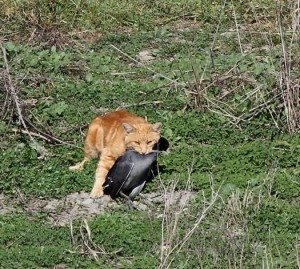Number-One Killer of Birds is Outdoor Cats
The following is an Opinion piece published in the San Francisco Chronicle on Tuesday February 5, by Golden Gate Bird Alliance Executive Director Mike Lynes.
By Mike Lynes
Everyone knows that cats are hunters. But even wildlife experts were stunned by a new report last week that as many as 3.7 billion birds are killed by outdoor cats in the contiguous United States each year. That’s far more than the 1 billion that previously had been estimated, and more than are killed by any other single source such as collisions or oil spills.
This peer-reviewed study – by the Smithsonian Conservation Biology Institute and the U.S. Fish and Wildlife Service – must serve as a wake-up call to people who care both about cats and about wildlife.

The implication for domestic cats is clear: Owners need to keep them inside.
This protects not just birds and other wildlife but the cats themselves, keeping them safe from hazards such as traffic, dogs and poison.
The implication for unowned or feral cats is more complicated. Last week’s study indicated that unowned cats are responsible for the vast majority of bird deaths – 70 percent. Yet policies in cities like San Francisco do little to address the gruesome toll of feral cats on wildlife.
San Francisco SPCA operates a trap-neuter-release program that stops some feral cats from reproducing but does nothing to stop them from hunting and devouring birds. The city also countenances feral cat feeding colonies, where well-meaning citizens provide food for large numbers of outdoor cats.
But this study documents that even well-fed cats are killers. Feeding and maintaining large feral cat populations may seem humane for the cats – but it is a death warrant for birds and other wildlife.
It’s time for San Franciscans and other animal lovers to expand their definition of “humane animal care” to include the needs of wildlife as well as domestic pets.
We have many opportunities to do so. First, we can strengthen efforts to educate cat owners about keeping their cats indoors and not abandoning them in parks if they need to give them up.
Second, trap-neuter-return should be scientifically evaluated as a policy – something that has not been done. If it is not shown in peer-reviewed studies to be effective, then it should be discontinued and replaced with other solutions.
Trap-neuter-return should also be evaluated from an environmental perspective. Because it is significantly harming other wildlife, the city needs to take measures to mitigate those losses.
San Francisco can start limiting the death toll from outdoor cats by making some parts of the city off-limits to feral cat feeding and trap-neuter-return programs.
The city should complete the Significant Natural Resource Areas Management Plan process and prohibit feral cat feeding and trap-neuter-return in our most important natural areas. At a minimum, these key areas should become urban refuges where wildlife can thrive without constant threat of feline decimation.
It’s time for people concerned about the ethical and humane treatment of animals to acknowledge the damage done by outdoor cat populations. Then we can work together to limit that damage in ways that will enhance the lives of both cats and wildlife – both of which do so much to enhance our own human lives.
—————————–
Want to help protect birds from cats? Talk to the cat owners you know about how keeping cats indoors is better and healthier both for birds and for cats. Or get involved on a policy level through Golden Gate Bird Alliance’s local Conservation Committees.
Want more info? You can read the Smithsonian/FWS study itself here. Or see the fascinating research done at the University of Georgia in which they attached tiny “kitty cams” to the collars of free-roaming cats, and recorded what the cats did when their owners weren’t around.
